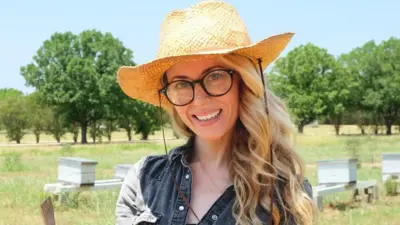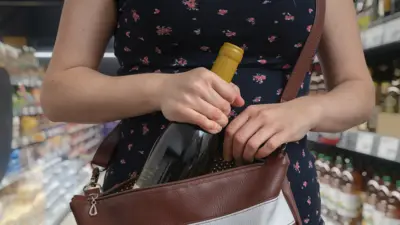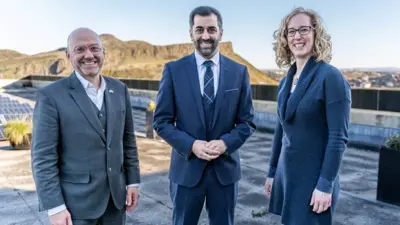We've updated our Privacy and Cookies Policy
We've made some important changes to our Privacy and Cookies Policy and we want you to know what this means for you and your data.
What if we only ate food from local farms?
- By Mary McCool
- BBC Scotland news
Image source, Getty Images
In recent years there has been mounting pressure to rethink what we eat in order to reduce climate change.
Many people have switched to veganism due to their concerns over the environmental impact of the global meat and dairy industries.
But farmers, butchers and grocers across the UK are pushing for an alternative.
They would like to see more people eating foods that are produced in their local area, significantly reducing the distance from farm to fork.
But is this sort of lifestyle realistic - or even possible - in a society where 24-hour big brand supermarkets allow us to consume anything that takes our fancy?
'It's fresher and tastes like home'
Image source, Dorothea Warlich
IT worker Dorothea Warlich buys organic food from her local grocery in Glasgow, which makes up the majority of her diet.
She has a degree in horticulture, and has been practising a local diet for so long that she no longer gives it much thought.
The environmental argument for this way of life over diets such as veganism, she says, is that plant-based diets can rely heavily on imported produce.
Avocados and soya largely come from central and south America - although a portion of soya we import is fed to livestock.
"There has to be a refocus on supplying ourselves with food - that's something that motivates me," said Dorothae, who is originally from Germany.
"With climate change a lot of countries will struggle to produce the amount of food they're consuming, but the UK will do comparatively well."
One of the major challenges for Ms Warlich is sourcing organic, seasonal foods from supermarkets - which she says are quite "global in what they sell".
She said: "There's not much organic food, whereas there's much more in other countries in Europe - you don't really need to think about it.
"It's enjoyable to eat food that comes from nearby - it's fresher and represents the area that you are in."
'Hearty stews are good for the soul'
Image source, Locavore
Reuben Chesters, owner of the sustainable food social enterprise Locavore, has been eating local produce almost exclusively for many years.
He says that an increasing number of people in Glasgow are interested in local produce and that demand is so strong, he has expanded his grocery shop, in the city's Govanhill area, twice in recent years.
One of the joys of his diet, he says, is taking advantage of seasonal changes - which during the winter means lots of root vegetables and things like squash, which store well.
"At this time of year I have soups and hearty stews that are good for the soul," he said.
When spring arrives, he replaces warm dishes with leafy greens, fresh salads, spinach, rocket, chard, spring kale and baby carrots.
Meat does come into his diet - but far less than your average Brit.
He says that large-scale meat farms are harmful to the environment because animals are fattened on imported crops - but that this is not the only option for consumers.
He said: "The animals on the farms I use are entirely grass-fed, so the nutrients are kept in the area. The dialogue is plant-based = good, meat = bad, but it's more complicated than that."
Image source, Getty Images
Mr Chesters agrees that leading this sort of lifestyle can be more expensive for families in low-income households.
He estimates he spends around £30-40 per week on food - which includes a £10 vegetable box from his own shop - but that it could be done for around £25 for an adult who ate mostly vegetables and grains.
"It depends on what you're replacing," he said. "If you're buying processed food it's much better to buy local and cook for yourself. If you're buying frozen pizzas and ice cream it's probably cheaper than that as well."
In Scotland the majority of farmland is currently used for sheep, beef and other cattle, largely in Aberdeenshire in the Highlands. Dairy farming mostly occurs in the south west of Scotland with poultry in Tayside and Fife.
In order for every person to have access to a locally-sourced diet, Mr Chesters says a greater proportion of the land would need to be shared among a variety of farmers - rather than "big food" selling "500 different types of frozen potatoes".
How would my diet change?
If you live in Scotland and want to eat locally, the majority of your diet would come from fruit and vegetables as well as oats and grains in order to keep things cost-effective.
That's not to say meat is off the table - just in lower supply. Animals used for meat products would ideally be fed with grass grown on their own farms, as opposed to being fattened on imported crops on an industrial scale, according to industry professionals.
Living in this manner would involve cutting out processed foods, meaning almost all of your diet would have to be cooked fresh.
And because of seasonal changes, some items would not be available to buy during certain months - although Scottish farms are able to produce a variety of foods at all times of the year.
In January for example, Scottish farmers enjoy health crops of apples, beetroot, broccoli, Jerusalem artichokes, and various root vegetables. It's also the time when lamb, pheasant and venison is produced alongside beef and chicken.
And despite what is known as the "hungry gap" around March, Scotland still produces a variety of fish and seafood, and is the only grower of short sea kale during the season.
Top Stories
Features & Analysis
Most read
Content is not available








